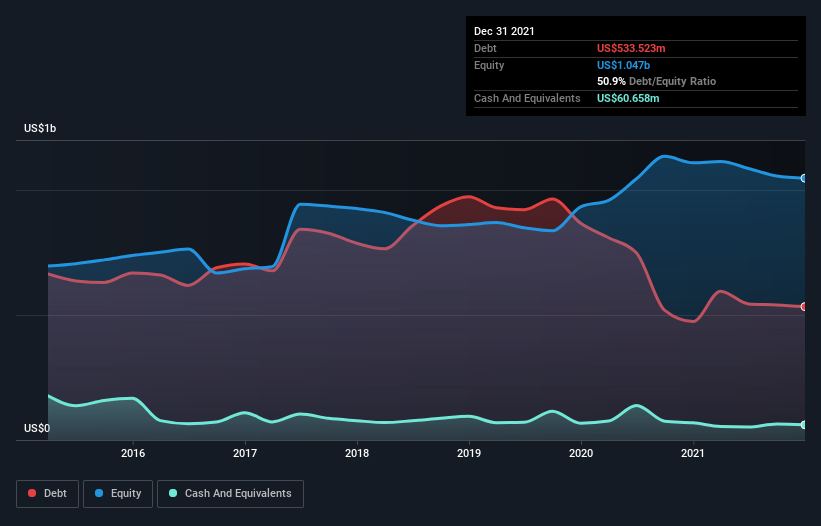Howard Marks put it nicely when he said that, rather than worrying about share price volatility, 'The possibility of permanent loss is the risk I worry about... and every practical investor I know worries about.' So it might be obvious that you need to consider debt, when you think about how risky any given stock is, because too much debt can sink a company. As with many other companies DHT Holdings, Inc. (NYSE:DHT) makes use of debt. But is this debt a concern to shareholders?
When Is Debt A Problem?
Debt assists a business until the business has trouble paying it off, either with new capital or with free cash flow. In the worst case scenario, a company can go bankrupt if it cannot pay its creditors. However, a more usual (but still expensive) situation is where a company must dilute shareholders at a cheap share price simply to get debt under control. Of course, debt can be an important tool in businesses, particularly capital heavy businesses. When we think about a company's use of debt, we first look at cash and debt together.
Check out our latest analysis for DHT Holdings
How Much Debt Does DHT Holdings Carry?
You can click the graphic below for the historical numbers, but it shows that as of December 2021 DHT Holdings had US$533.5m of debt, an increase on US$473.6m, over one year. However, because it has a cash reserve of US$60.7m, its net debt is less, at about US$472.9m.

How Strong Is DHT Holdings' Balance Sheet?
We can see from the most recent balance sheet that DHT Holdings had liabilities of US$41.9m falling due within a year, and liabilities of US$520.1m due beyond that. Offsetting these obligations, it had cash of US$60.7m as well as receivables valued at US$30.4m due within 12 months. So its liabilities total US$471.0m more than the combination of its cash and short-term receivables.
While this might seem like a lot, it is not so bad since DHT Holdings has a market capitalization of US$946.9m, and so it could probably strengthen its balance sheet by raising capital if it needed to. However, it is still worthwhile taking a close look at its ability to pay off debt. There's no doubt that we learn most about debt from the balance sheet. But it is future earnings, more than anything, that will determine DHT Holdings's ability to maintain a healthy balance sheet going forward. So if you're focused on the future you can check out this free report showing analyst profit forecasts.
Over 12 months, DHT Holdings made a loss at the EBIT level, and saw its revenue drop to US$296m, which is a fall of 57%. That makes us nervous, to say the least.
Caveat Emptor
Not only did DHT Holdings's revenue slip over the last twelve months, but it also produced negative earnings before interest and tax (EBIT). Indeed, it lost US$20m at the EBIT level. When we look at that and recall the liabilities on its balance sheet, relative to cash, it seems unwise to us for the company to have any debt. Quite frankly we think the balance sheet is far from match-fit, although it could be improved with time. Another cause for caution is that is bled US$114m in negative free cash flow over the last twelve months. So suffice it to say we consider the stock very risky. When analysing debt levels, the balance sheet is the obvious place to start. But ultimately, every company can contain risks that exist outside of the balance sheet. Be aware that DHT Holdings is showing 2 warning signs in our investment analysis , you should know about...
At the end of the day, it's often better to focus on companies that are free from net debt. You can access our special list of such companies (all with a track record of profit growth). It's free.
New: Manage All Your Stock Portfolios in One Place
We've created the ultimate portfolio companion for stock investors, and it's free.
• Connect an unlimited number of Portfolios and see your total in one currency
• Be alerted to new Warning Signs or Risks via email or mobile
• Track the Fair Value of your stocks
Have feedback on this article? Concerned about the content? Get in touch with us directly. Alternatively, email editorial-team (at) simplywallst.com.
This article by Simply Wall St is general in nature. We provide commentary based on historical data and analyst forecasts only using an unbiased methodology and our articles are not intended to be financial advice. It does not constitute a recommendation to buy or sell any stock, and does not take account of your objectives, or your financial situation. We aim to bring you long-term focused analysis driven by fundamental data. Note that our analysis may not factor in the latest price-sensitive company announcements or qualitative material. Simply Wall St has no position in any stocks mentioned.
About NYSE:DHT
DHT Holdings
Through its subsidiaries, owns and operates crude oil tankers primarily in Monaco, Singapore, Norway, and India.
Undervalued with solid track record and pays a dividend.
Similar Companies
Market Insights
Community Narratives



